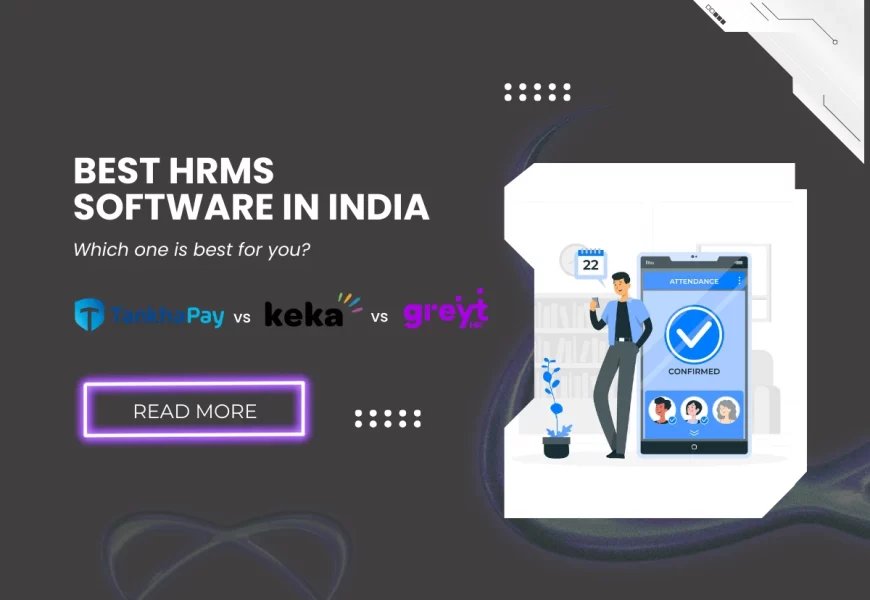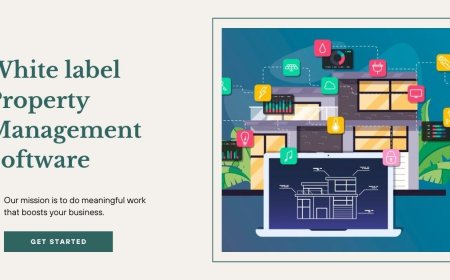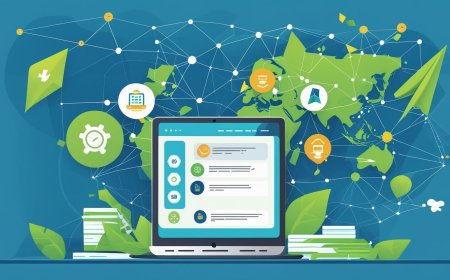How HR Software is Evolving in India
Discover how HR software in India is transforming with advanced features like AI, cloud solutions, and employee self-service. Explore the latest trends shaping HR technology in 2025.

Human Resource (HR) management has undergone a significant transformation over the past decade, particularly in India, where businesses are rapidly adopting technology to streamline operations. HR software in India has evolved from basic payroll systems to comprehensive platforms that integrate artificial intelligence (AI), cloud computing, and employee-centric features. As organizations strive to enhance workforce efficiency and adapt to a dynamic work environment, HR software has become a cornerstone of modern business strategy. This blog explores the current state of HR software in India, its key developments, and the trends shaping its future.
The Rise of HR Software in India
India's fast-growing economy and diverse workforce have created a unique demand for HR software tailored to local needs. With over 1.4 billion people and a burgeoning startup ecosystem, businesses in India face challenges such as managing large workforces, ensuring compliance with labor laws, and fostering employee engagement. HR software has emerged as a solution to these challenges, offering tools to automate processes, improve decision-making, and enhance employee experiences.
The adoption of HR software in India has been fueled by several factors:
-
Digital Transformation: The push for digitization across industries has led companies to replace manual HR processes with automated systems.
-
Remote Work Culture: The shift to hybrid and remote work models post-2020 has increased the need for cloud-based HR platforms that support flexibility.
-
Compliance Requirements: India's complex labor laws and regulations necessitate robust HR systems to ensure compliance with statutory requirements like PF, ESI, and TDS.
-
Employee Expectations: Modern employees expect seamless digital experiences, from onboarding to performance reviews, driving demand for user-friendly HR tools.
Key Features of Modern HR Software in India
Todays HR software in India is designed to address the unique needs of businesses while incorporating global best practices. Below are some of the standout features driving the evolution of HR software:
1. Cloud-Based Solutions
Cloud-based HR software has become the backbone of modern HR management in India. These platforms allow businesses to access HR tools from anywhere, making them ideal for remote and hybrid work environments. Cloud solutions also offer scalability, enabling small startups and large enterprises alike to customize features based on their needs. Leading HR software providers in India, such as Zoho People, Keka, and greytHR, offer cloud-based platforms with seamless updates and integrations.
2. AI and Automation
Artificial intelligence is revolutionizing HR software by automating repetitive tasks and providing data-driven insights. AI-powered features include:
-
Recruitment Automation: AI tools screen resumes, match candidates to job roles, and even conduct initial interviews using chatbots.
-
Employee Sentiment Analysis: AI analyzes employee feedback to gauge engagement and identify potential issues.
-
Predictive Analytics: HR software uses AI to predict employee turnover, helping managers take proactive measures. For example, platforms like Darwinbox leverage AI to offer personalized employee experiences and optimize workforce planning.
3. Employee Self-Service Portals
Employee self-service (ESS) portals empower workers to manage their HR tasks independently. Employees can update personal details, apply for leaves, access payslips, and submit expense claims through mobile apps or web portals. This feature reduces the administrative burden on HR teams and enhances employee satisfaction. In India, where mobile penetration is high, ESS portals have become a critical component of HR software.
4. Payroll and Compliance Management
Indias regulatory landscape is complex, with frequent changes in labor laws and tax policies. Modern HR software simplifies payroll processing and ensures compliance with regulations like Provident Fund (PF), Employee State Insurance (ESI), and Goods and Services Tax (GST). Platforms like Tankhapay, greytHR and Keka are designed to handle India-specific compliance requirements, making them popular among businesses of all sizes.
5. Performance Management and Analytics
Performance management tools have evolved beyond annual reviews to continuous feedback systems. HR software in India now includes features like goal tracking, 360-degree feedback, and performance analytics. These tools help organizations align employee goals with business objectives and foster a culture of continuous improvement.
6. Integration with Other Systems
Modern HR software integrates seamlessly with other business tools, such as accounting software (e.g., Tally, QuickBooks), collaboration platforms (e.g., Slack, Microsoft Teams), and recruitment platforms (e.g., Naukri, LinkedIn). This interoperability ensures a unified ecosystem, reducing data silos and improving efficiency.
Trends Shaping the Future of HR Software in India
As technology advances, HR software in India is poised for further innovation. Here are the key trends to watch in 2025 and beyond:
1. Focus on Employee Well-Being
Employee mental health and well-being have become priorities for organizations. HR software providers are incorporating wellness modules that offer resources like stress management tools, virtual counseling, and fitness challenges. For instance, platforms like Plum and Loop Health integrate wellness programs into their HR suites, catering to the growing demand for holistic employee support.
2. Mobile-First Approach
With Indias smartphone penetration expected to exceed 1 billion by 2026, HR software providers are prioritizing mobile-first solutions. Employees can access HR services on the go, from submitting leave requests to participating in training programs. Mobile apps also enable real-time notifications, ensuring timely communication between HR teams and employees.
3. Diversity, Equity, and Inclusion (DEI) Tools
DEI has gained prominence in India, with organizations striving to create inclusive workplaces. HR software now includes features to track diversity metrics, eliminate bias in hiring, and promote equitable career opportunities. These tools help companies align with global DEI standards while addressing Indias unique cultural and social dynamics.
4. Gig Economy Integration
Indias gig economy is booming, with millions of freelancers and contract workers contributing to the workforce. HR software is adapting to manage gig workers effectively, offering features like contract management, flexible payroll, and performance tracking for non-traditional employees.
5. Blockchain for Data Security
Data security is a growing concern, especially for HR systems that handle sensitive employee information. Blockchain technology is being explored to ensure secure storage and sharing of HR data, such as employee records and payroll information. While still in its early stages, blockchain-based HR solutions could become mainstream in India over the next few years.
6. Personalized Employee Experiences
Personalization is a key differentiator in modern HR software. Platforms use data analytics to tailor employee experiences, from customized onboarding journeys to personalized learning and development plans. This trend aligns with the expectations of Indias young, tech-savvy workforce.
Challenges in Adopting HR Software in India
Despite its benefits, the adoption of HR software in India faces several challenges:
-
Cost Concerns: Small and medium enterprises (SMEs) may find it difficult to invest in premium HR software due to budget constraints.
-
Resistance to Change: Traditional organizations may resist transitioning from manual processes to digital platforms.
-
Data Privacy: With increasing cyber threats, ensuring the security of employee data is a priority for HR software providers.
-
Skill Gaps: HR teams may require training to fully utilize advanced features like AI and analytics.
To address these challenges, HR software providers are offering affordable pricing plans, user-friendly interfaces, and robust customer support to encourage adoption.
The Future of HR Software in India
The future of HR software in India is bright, with continued advancements in technology and a growing emphasis on employee-centric solutions. As businesses scale and globalize, HR software will play a critical role in enabling organizations to attract, retain, and develop talent. Key developments to expect include:
-
Greater adoption of AI and machine learning for predictive HR analytics.
-
Enhanced integration with emerging technologies like the Internet of Things (IoT) for workplace monitoring.
-
Expansion of HR software to cater to micro-businesses and startups with cost-effective solutions.
-
Increased focus on sustainability and corporate social responsibility (CSR) tracking within HR platforms.
Conclusion
HR software in India has come a long way from basic payroll tools to sophisticated platforms that drive organizational success. With features like AI automation, cloud accessibility, and employee self-service, these solutions are empowering businesses to navigate the complexities of HR management. As technology continues to evolve, HR software will remain a vital tool for fostering innovation, compliance, and employee satisfaction in Indias dynamic business landscape. Whether youre a small startup or a large enterprise, investing in the right HR software can unlock new opportunities for growth and efficiency.
Call to Action: Are you ready to transform your HR processes? Explore leading HR software in India like Tankhapay, Keka, or greytHR to find the perfect fit for your business needs.


































